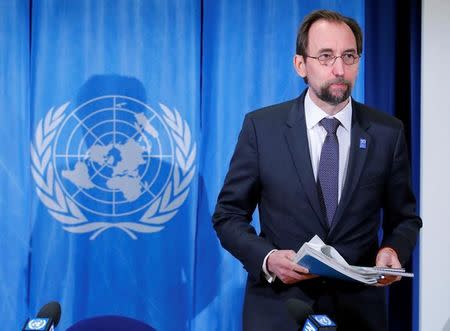U.N.'s Zeid slams big powers' "empty words" on Syria chemical attack

GENEVA (Reuters) - The U.N. human rights chief lambasted U.N. Security Council members on Monday for offering only "feeble condemnations" of a chemical attack in Syria, saying the failure to react more strongly could have dire consequences for decades.
"A number of very powerful states are directly involved in the conflict in Syria, and yet they have completely failed to halt this ominous regression towards a chemical weapons free-for-all," Zeid Ra'ad al-Hussein said in a statement.
“This collective shrug to yet another possible use of one of the most ghastly weapons ever devised by man is incredibly dangerous."
Witnesses and medical workers reported as many as 60 deaths in the rebel-held town of Douma on Saturday, with nearly a thousand injured, after at least two bombs hit a hospital and nearby buildings.
“Verbal condemnation is clearly grossly insufficient, and the abject failure to even properly investigate each and every allegation of chemical attacks by all sides further encourages the use of such despicable weapons and undermines the legitimacy of the international legal order,” Zeid said.
There have been at least 35 chemical weapons attacks in Syria since 2013 as the parties to the conflict and their supporters push the door wide open to the use of the banned weapon, he said.
The Chemical Weapons Convention has been ratified by 192 states, making it one of the most universally supported treaties in international law. But Zeid said the rules were being flouted.
“And the world’s response? Empty words, feeble condemnations, and a Security Council paralysed by the use of the veto."
The world needed to wake up fast to the irreparable damage being done to global arms control, after decades in which it appeared that chemical and biological weapons had been successfully outlawed.
"The world is sitting idly by while their use is becoming normalised in Syria," he said.
(Reporting by Tom Miles; Editing by Kevin Liffey)

